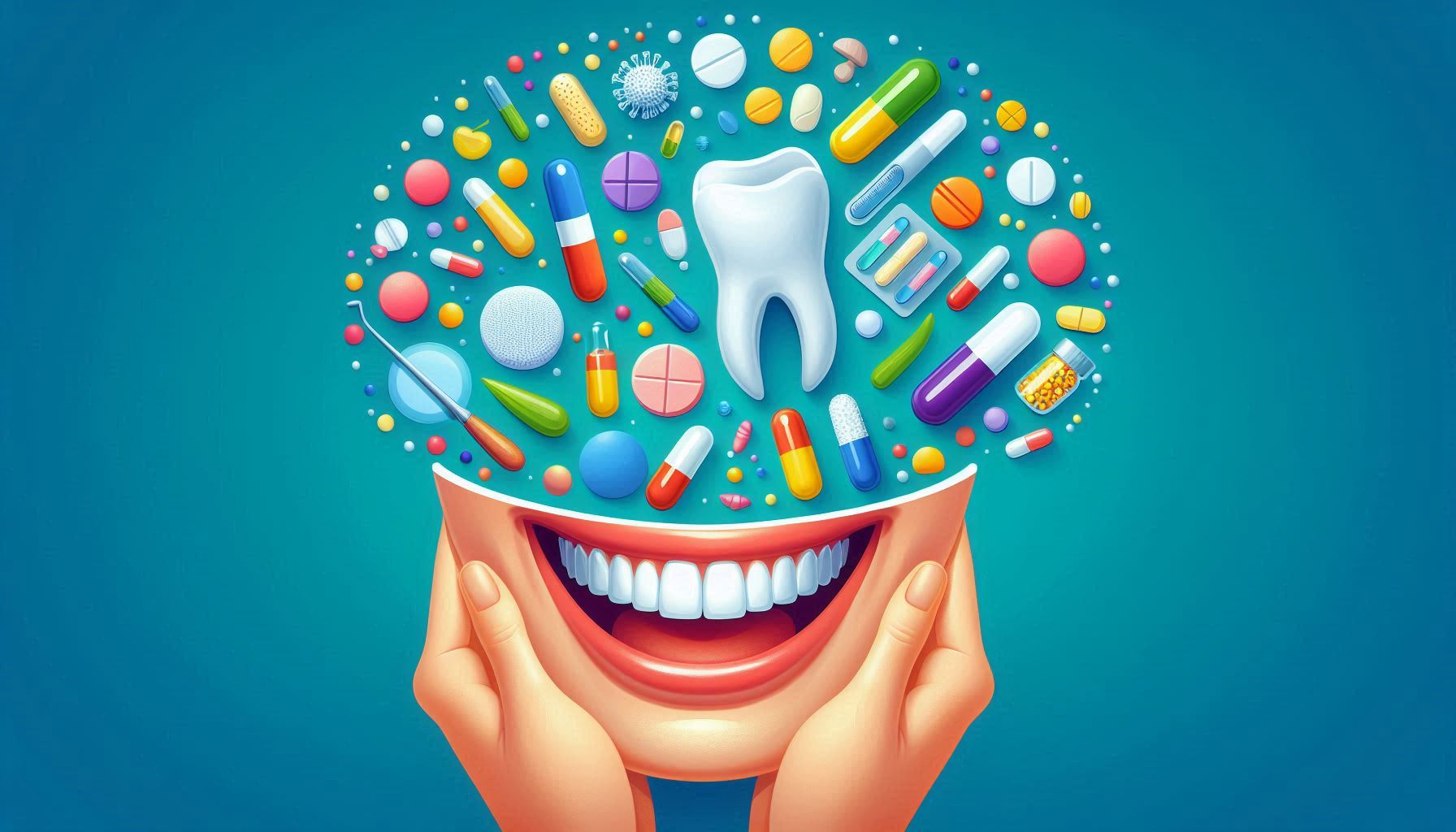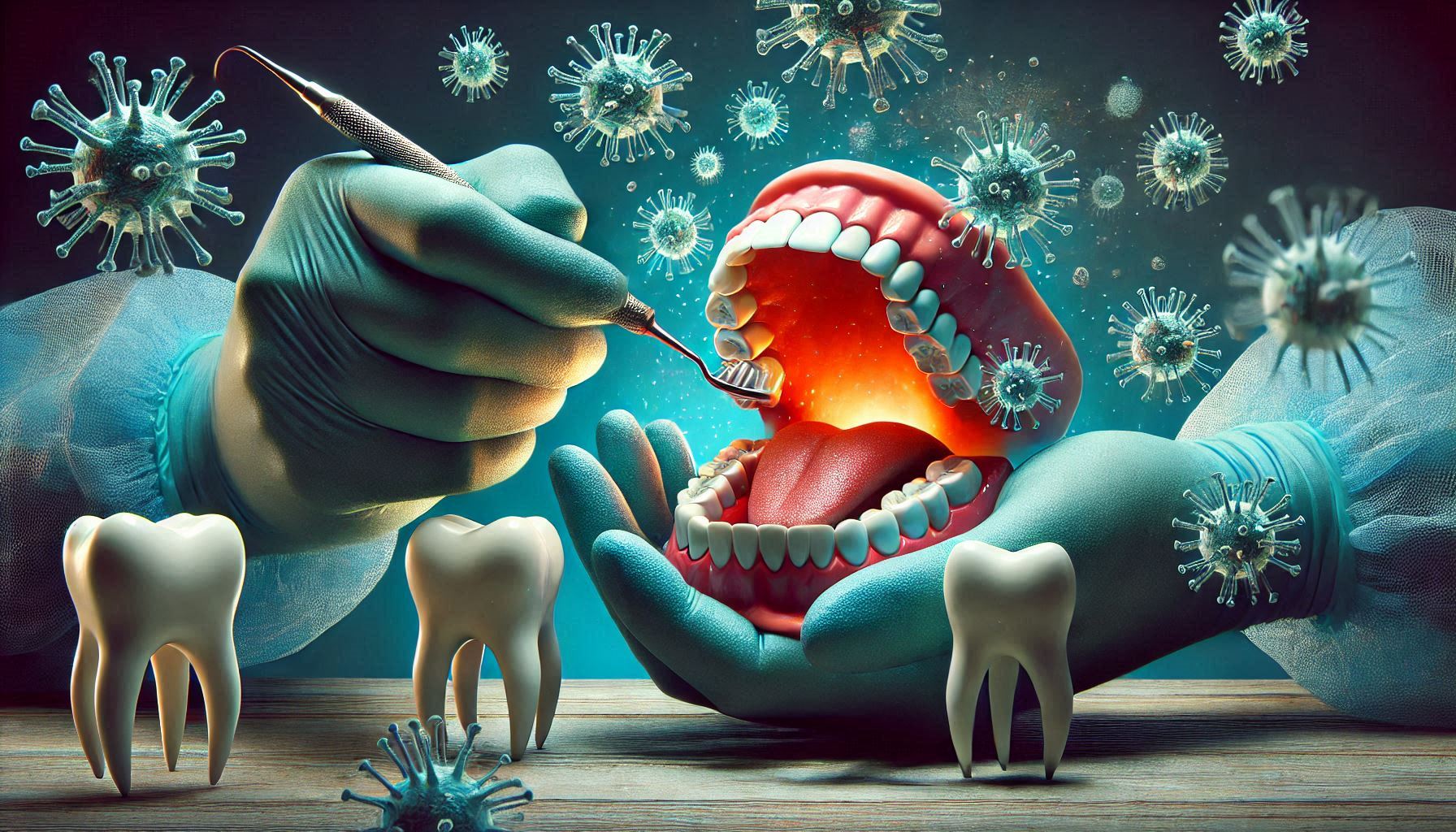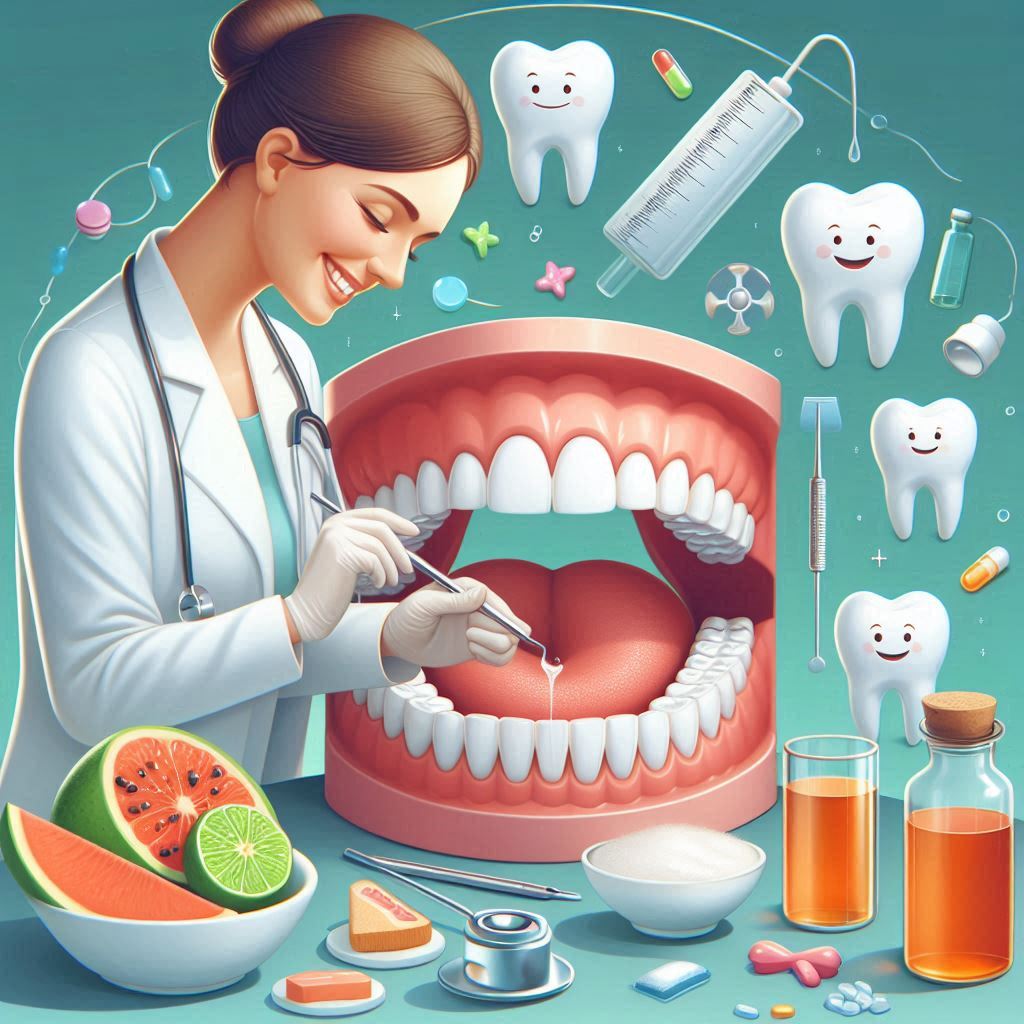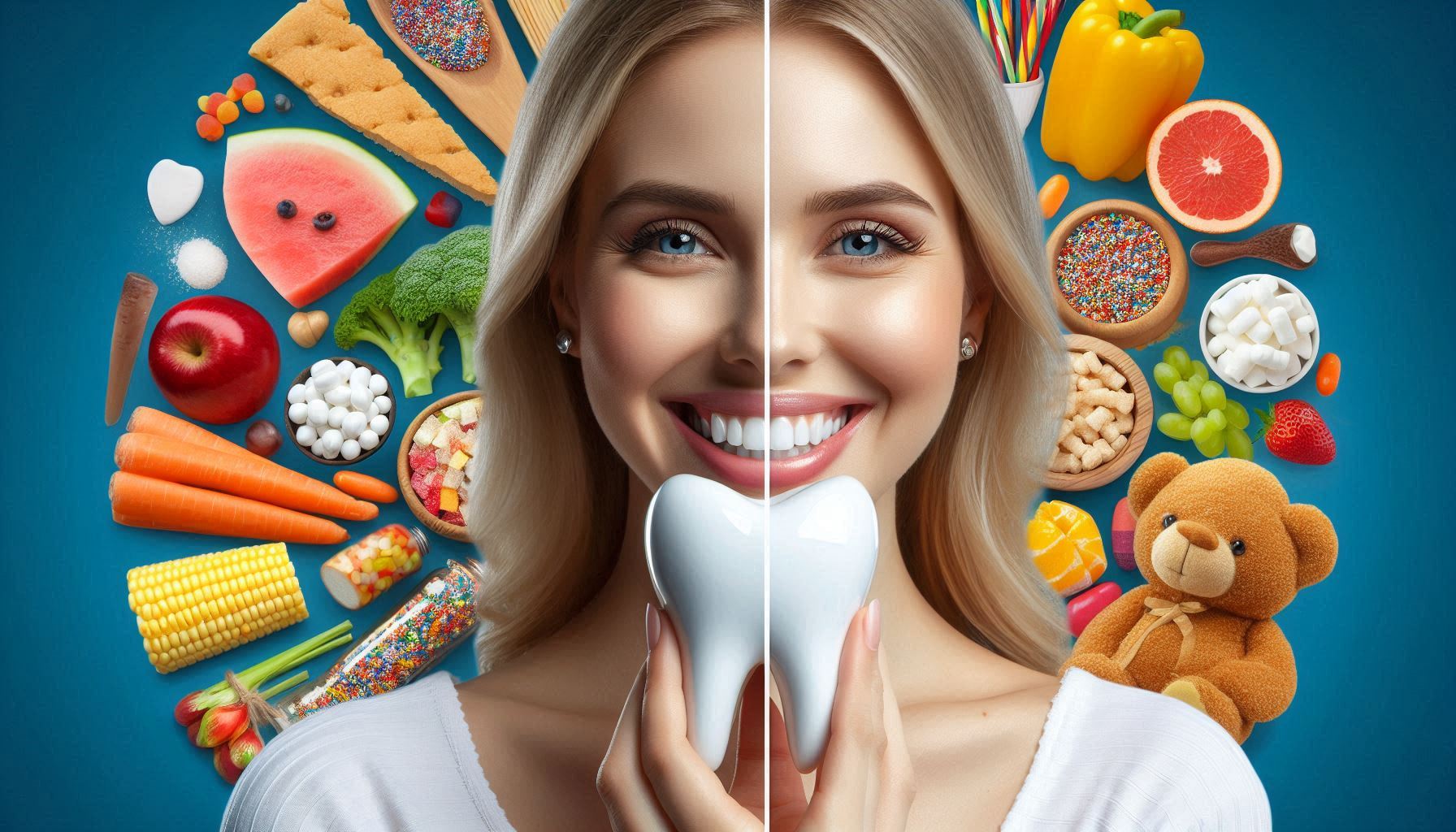Introduction:
Medications are indispensable tools in modern healthcare, offering relief and treatment for various conditions, from mild illnesses to chronic diseases. However, while medications work wonders for systemic health, they often bring unintended side effects that impact oral health. These effects can range from minor inconveniences, such as a dry mouth, to more severe complications, like gum disease, tooth decay, or even infections. Therefore, understanding the link between medications and oral health is crucial for maintaining overall well-being.
The goal of this article is to explore the connection between medications and oral health, shedding light on how different drugs affect the mouth, what complications may arise, and offering practical advice on how to prevent or manage these issues. With detailed insights into specific medications, side effects, and preventive measures, this article serves as an essential resource for anyone taking prescription drugs, over-the-counter medication, or even supplements.
Understanding the Link Between Medications and Oral Health
The Basics of Oral Health:
Oral health refers to the well-being of the teeth, gums, tongue, and the structures that support them. Good oral health is crucial for overall health, affecting speech, eating, and even self-esteem. Poor oral hygiene can lead to a range of issues, including cavities, gum disease, and tooth loss, which in turn may contribute to systemic problems such as heart disease, diabetes, and respiratory infections.
The mouth is home to various structures:
- Teeth: These are crucial for chewing food and play a significant role in speech.
- Gums (Gingiva): Gums protect the roots of your teeth and support your dental structures.
- Salivary Glands: Saliva helps maintain oral hygiene by neutralizing acids, washing away food particles, and protecting against bacteria.
- Tongue and Cheeks: These help with chewing, swallowing, and tasting food, and they also play a role in cleaning the mouth.
Proper oral care, including brushing, flossing, and visiting the dentist regularly, is essential for maintaining these structures. Neglecting oral hygiene can result in bacterial growth, plaque formation, and subsequent oral diseases.
How Medications Work in the Body:
Medications are designed to treat various health conditions by interacting with specific systems in the body. Depending on their class, they may influence the central nervous system, immune system, cardiovascular system, and other bodily functions. Many medications enter the bloodstream and are processed by the liver and kidneys before being distributed throughout the body.
In the case of oral health, medications can interact with the mouth and surrounding structures in numerous ways:
- Direct Effects: Medications may have a direct impact on the tissues in the mouth, such as causing irritation, inflammation, or altering the balance of bacteria in the mouth.
- Indirect Effects: Some medications can affect the body’s ability to produce saliva or impact overall health in a way that indirectly influences oral health.
Understanding how medications affect the body—and specifically the oral cavity—is key to mitigating their negative effects on oral health.
Common Medications and Their Impact on Oral Health
Medications That Cause Dry Mouth (Xerostomia):
Dry mouth, or xerostomia, is one of the most common medication-related oral health problems. Saliva plays a crucial role in oral health by moistening the mouth, aiding in digestion, washing away food particles, and helping to neutralize acids. When saliva production is reduced, individuals may experience difficulty swallowing, speaking, and eating, and may be more prone to tooth decay, gum disease, and oral infections.
Common Medications That Cause Dry Mouth:
- Antihistamines (e.g., diphenhydramine, loratadine): Often prescribed for allergies, antihistamines block the effects of histamines, but they also reduce the secretion of saliva.
- Antidepressants and Antianxiety Medications (e.g., SSRIs like fluoxetine, benzodiazepines like lorazepam): These medications affect neurotransmitters in the brain and can interfere with salivary gland function.
- Antihypertensives (e.g., diuretics like furosemide, beta-blockers): Diuretics increase urine output and can lead to dehydration, which contributes to dry mouth.
- Pain Relievers (e.g., opioids, NSAIDs): Opioids, such as morphine and oxycodone, decrease saliva production as a side effect, and NSAIDs like ibuprofen can lead to dehydration, worsening dry mouth.
- Diuretics (e.g., hydrochlorothiazide): These medications are used to reduce fluid buildup and lower blood pressure but can cause dehydration, leading to a dry mouth.
Consequences of Dry Mouth:
- Increased risk of tooth decay due to reduced ability to neutralize acids
- Higher susceptibility to gum disease and oral infections
- Difficulty chewing, swallowing, or speaking
- Bad breath (halitosis)
Prevention and Management:
- Drink plenty of water throughout the day to stay hydrated
- Use saliva substitutes or mouthwashes designed to moisten the mouth
- Chew sugar-free gum to stimulate saliva production
- Avoid alcohol-based mouthwashes that can worsen dry mouth
- Maintain regular dental visits to monitor oral health
Medications That Cause Gum Problems:
Certain medications can lead to changes in gum health, including gingival hyperplasia (enlarged or swollen gums). Gingival overgrowth can cause difficulty in maintaining proper oral hygiene, leading to plaque accumulation and an increased risk of gum disease and tooth loss.
Medications That Cause Gingival Hyperplasia:
- Anticonvulsants (e.g., phenytoin): Often prescribed for epilepsy, these medications can cause an overgrowth of the gums, especially when taken for extended periods.
- Immunosuppressants (e.g., cyclosporine): Used to prevent organ rejection after transplants, cyclosporine can lead to gum enlargement.
- Calcium Channel Blockers (e.g., nifedipine, amlodipine): These medications, often used for high blood pressure and heart conditions, can cause gum swelling and discomfort.
Managing Gingival Hyperplasia:
- Proper oral hygiene is critical to managing gum health and preventing further swelling.
- In some cases, a dentist may recommend professional cleaning, surgery, or laser treatments to remove excess gum tissue.
- Adjustments in the medication dosage may be required under the guidance of a healthcare provider.
Medications That Increase the Risk of Cavities and Tooth Decay:
Some medications, particularly those that reduce saliva flow, can increase the risk of tooth decay (cavities). Saliva helps wash away food particles and neutralize acids in the mouth. Without sufficient saliva, the teeth are more susceptible to cavities, especially when combined with poor oral hygiene or a high-sugar diet.
Medications That Contribute to Tooth Decay:
- Antihistamines and Decongestants: By reducing saliva production, these medications leave the teeth more vulnerable to plaque and decay.
- Antidepressants: SSRIs (Selective Serotonin Reuptake Inhibitors) and other types of antidepressants can dry out the mouth, contributing to tooth decay.
- Diuretics: Increased urine output and dehydration can dry out the mouth, leading to an increased risk of cavities.
- Sugar-Containing Syrups and Medications: Some over-the-counter medications, particularly cough syrups, contain sugars that stick to the teeth and promote decay.
Preventing Tooth Decay:
- Brush teeth with fluoride toothpaste twice a day
- Floss regularly to remove food particles from between teeth
- Use mouthwash to help kill bacteria and freshen breath
- Limit sugary foods and drinks that can contribute to cavities
- Visit the dentist regularly for professional cleanings and fluoride treatments
Medications That Affect Taste and Smell:
Some medications can alter the sense of taste, resulting in an unpleasant or metallic taste in the mouth. This alteration may affect appetite and cause discomfort during eating, potentially leading to poor nutrition or changes in eating habits.
Medications That Alter Taste:
- Antibiotics (e.g., metronidazole, amoxicillin): Some antibiotics can cause a metallic or bitter taste in the mouth.
- Antidepressants: Some drugs in this category may alter the taste perception.
- Antihypertensives: Certain blood pressure medications have been linked to taste disturbances.
Managing Taste Alterations:
- Rinse the mouth with water or a mild mouthwash after taking medication to reduce unpleasant tastes
- Use sugar-free gum or mints to help mask the taste
- Consult with a healthcare provider about changing medications if taste issues persist
Medications That Lead to Oral Infections:
Certain medications can weaken the immune system, making the mouth more susceptible to infections like oral candidiasis (thrush). This fungal infection can lead to painful white patches in the mouth and difficulty swallowing.
Medications That Increase Infection Risk:
- Chemotherapy and Radiation: These treatments can significantly weaken the immune system and leave the mouth vulnerable to fungal and bacterial infections.
- Corticosteroids (e.g., prednisone): Steroids can suppress the immune system, making it harder for the body to fight infections.
- Immunosuppressants: Drugs like methotrexate or biologic agents for autoimmune conditions can lower immune response and increase the risk of infections.
Preventing Oral Infections:
- Practice good oral hygiene, especially during chemotherapy or steroid treatments
- Use antifungal mouth rinses if prescribed
- Visit the dentist regularly for monitoring oral health and infections
Managing Oral Health While on Medication
Prevention Strategies:
Preventive care is the cornerstone of oral health management while on medications. This includes regular dental visits, proper oral hygiene, and lifestyle changes to combat medication-related side effects.
Key Preventive Measures:
- Maintain good oral hygiene: brush at least twice a day, floss daily, and use fluoride mouthwash.
- Drink water frequently to help keep the mouth moist.
- Consider using a humidifier at night if dry mouth is an issue.
- Use saliva substitutes or stimulants if necessary.
- Monitor diet and avoid excessive sugar or acidic foods that can contribute to decay.
The Role of Dentists and Healthcare Providers:
Collaboration between your dentist and healthcare provider is essential when managing the impact of medications on oral health. Dentists need to be aware of all medications you are taking to make informed decisions about your care.
What to Discuss with Your Dentist:
- Disclose all medications, including prescription drugs, over-the-counter drugs, and supplements.
- Regular dental check-ups to catch potential issues early.
Treatments for Medication-Induced Oral Health Issues:
Dentists offer various treatments tailored to manage medication-related oral health problems:
- Saliva Substitutes and Stimulants: Products like artificial saliva or sugar-free gum can help manage dry mouth.
- Fluoride Treatments: To protect teeth from decay, especially for those with dry mouth or reduced saliva.
- Gum Treatment: Scaling and root planing for gum disease or surgery for severe gingival overgrowth.
- Candidiasis Treatment: Antifungal treatments prescribed for infections caused by weakened immunity.
Conclusion
Medications play a pivotal role in managing health conditions, but they can significantly affect oral health. From causing dry mouth to increasing the risk of gum disease, medications present various challenges for individuals concerned with their oral well-being. By understanding how medications interact with the body and how to manage their side effects, patients can take proactive steps to safeguard their oral health.
Regular dental check-ups, good oral hygiene practices, and a collaborative approach with healthcare providers are essential in minimizing the adverse effects of medications. By following preventive strategies and seeking timely interventions, individuals can enjoy both systemic health benefits and optimal oral health.
SOURCES
Bailey, D. R. & Smith, L. T. (2019). The role of saliva in oral health: A review of the clinical applications. Journal of Oral Biology, 55(2), 101-115.
Baldwin, R. M. (2018). Drug-induced oral health problems: Identification and management. Oral Health Reviews, 22(3), 220-234.
Brown, J. A. & Kelley, S. P. (2020). Medication-induced xerostomia: A clinical overview. Dental Clinics of North America, 64(1), 75-89.
Choi, S. H. & Wong, T. S. (2017). The impact of antidepressant medications on oral health: A review. Journal of Clinical Pharmacy and Therapeutics, 42(5), 506-514.
Green, J. T. & Allen, R. H. (2021). The connection between diabetes medications and oral health: Risks and preventive strategies. Diabetes & Oral Health Journal, 15(1), 35-42.
Gupta, R. S. & Patel, K. S. (2022). Managing the side effects of medications on gum tissue: A clinical guide. Journal of Periodontology, 93(4), 411-420.
Harrison, M. K. & Chen, X. Z. (2021). Oral side effects of common hypertension drugs: A clinical overview. Journal of Dental Research, 100(12), 1389-1395.
Kline, P. D. (2018). Antibiotics and taste changes: Managing side effects for optimal oral health. The Journal of Antimicrobial Therapy, 41(7), 45-52.
Miller, C. H. & Shultz, C. W. (2020). Impact of chemotherapy and radiation on oral health: Prevention and management. Cancer Therapy Review, 34(2), 200-210.
Parker, J. E. & Lee, J. K. (2023). Medications and oral fungal infections: Risk factors and prevention. Journal of Oral Pathology, 42(1), 115-122.
Patterson, D. W. & Taylor, L. M. (2019). Oral health challenges in the elderly: The role of medications. The Geriatric Dental Journal, 7(4), 212-220.
Rogers, M. D. & Thomas, S. W. (2020). The effects of diuretics on oral health: A focus on dry mouth and tooth decay. Oral Medicine and Pharmacology, 28(3), 80-89.
Zhao, Y. L. & Wang, L. G. (2018). The effect of corticosteroids on oral health: An updated review. Journal of Clinical Dentistry, 22(5), 301-308.
HISTORY
Current Version
February 7, 2025
Written By:
SUMMIYAH MAHMOOD




